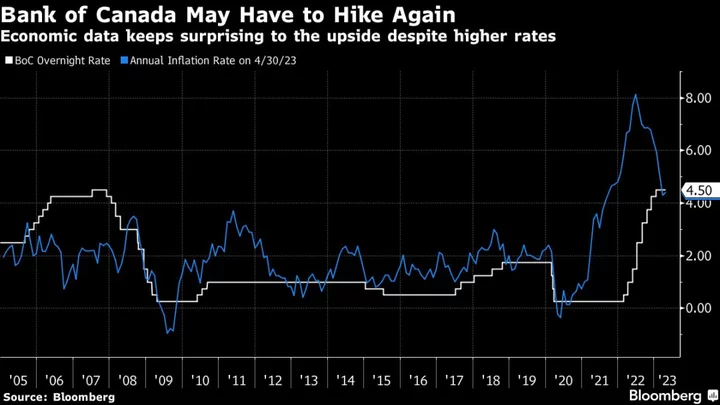Canada’s economy hasn’t buckled under the weight of higher borrowing costs. On the contrary: strong growth has more economists predicting the central bank will resume raising interest rates soon.
Thirteen of 17 economists surveyed by Bloomberg say the Canadian economy is proving less sensitive to higher rates than previously believed. Almost half now say the Bank of Canada will raise its benchmark overnight rate, currently 4.5%, between now and September. In the March survey, analysts unanimously said Governor Tiff Macklem’s next move would be a cut.
Going into this year, the consensus view was that Canada’s deeply indebted households would quickly cut back spending as they absorbed higher rates. That would in turn cause the economy to slow down earlier than other nations that aren’t so exposed to bloated home prices and mortgage debt.
The survey data suggest those perspectives are shifting. Canada’s economy grew at a 3.1% annualized pace in the first quarter, stronger than projected, while employers have added 344,000 jobs in six months. Consumer spending has been steady. It’s prompted some to change their minds about how tight monetary policy needs to get to bring inflation to heel.
“It’s not what, intuitively, I would have thought would be happening at this stage” of the rate cycle, Dawn Desjardins, chief economist at Deloitte in Canada, said in an interview. The economy is proving more resilient in part because a huge increase in savings during the Covid-19 pandemic has given some households a buffer, she said.
Economists at two of Canada’s major lenders — Bank of Nova Scotia and Toronto-Dominion Bank — say the central bank will raise borrowing costs at its meeting Wednesday, with markets putting the likelihood at almost a coin flip. Nearly 90% of respondents in the Bloomberg survey say policymakers have given sufficient notice to start boosting rates again.
While it’s difficult to pinpoint the primary cause for the country’s surprising resilience, there’s a growing consensus that fiscal authorities have been working at cross-purposes to the Bank of Canada. Nearly 70% of economists surveyed say Prime Minister Justin Trudeau’s generous spending programs and expanded targets for immigration have contributed to a need for higher interest rates this cycle, which saw the central bank increase borrowing costs by 425 basis points in less than a year.
Asked to respond to the survey, Finance Minister Chrystia Freeland’s office defended the government’s “responsible fiscal plan,” noted that Canada has the lowest debt-to-output ratio among the Group of Seven, and said immigration is an important driver of economic growth.
Since the Bank of Canada declared a conditional rate pause in January — a signal supported by four-fifths of respondents — economic data has continued to surprise to the upside. The labor market is showing few signs of strain; headline and underlying inflation are proving stubborn; and housing activity has started to rebound, with sales and prices rising in the country’s major cities.
The survey of 17 economists was conducted from May 30 to June 2.
Other Findings
- Rate cuts won’t start until the first quarter of next year, the survey shows
- More than 80% of economists say a soft landing is the most likely outcome, compared with two-thirds in the March survey
- Over three-quarters of respondents see inflation returning to the 2% target in 2024
- Nearly 70% of economists say the Bank of Canada’s policy rate can comfortably diverge from the Federal Reserve by as much as 100 basis points
- Almost 60% say the Bank of Canada could deliver a 25 basis point hike without intending to go any further than that

